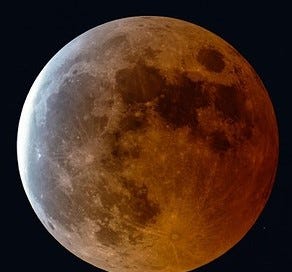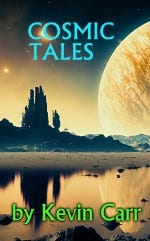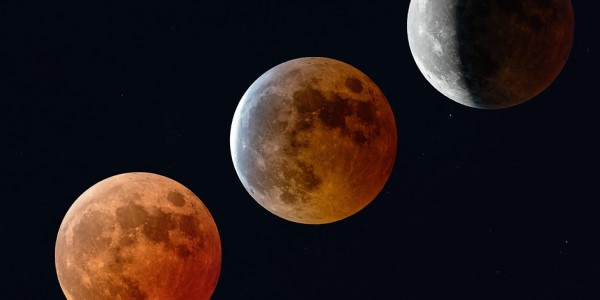"The Seed" - March 6, 2025
A lunar eclipse is the harbinger of the physical collapse of the planet...
Every Thursday, Silver Gecko Publishing highlights one of my stories, either a work of short fiction, a novel, or an audiobook. This week’s selection is the short story “The Seed,” from the anthology COSMIC TALES, available on Kindle, and in paperback.
I have always been a student of science, and as much as stories like The Atom from DC Comics, Ant-Man from Marvel, Fantastic Voyage by Isaac Asimov, and InnerSpace starring Dennis Quaid and Martin Short (which is quite a fun little film), I understand the physics behind the concept too well. Alas, none of these stories ever addressed the question of mass versus volume within the atom.
You can shrink an atom as much as you want, but unless you remove some of its mass, it will soon become unstable.
And that was the real genesis of this story.
While I was preparing COSMIC TALES for publication, I gave the copy to my lovely and gracious wife Carolyn, my most ardent supporter and reliable proofreader. God bless her because not everything I write is something she enjoys.
This story was the one that annoyed her the most in this volume, mainly because of how far into the weeds I went with the science.
That’s right… all the other nonsense bollocks I write about was fine. But this one crossed a line?
Sigh… everyone’s a critic.
-Kevin Carr
Click here to buy my books on Amazon.
Click here to buy my audiobooks on Audible.
Click here to follow me on TikTok.
Illustration by Kanenori (@Kanenori) from Pixabay
The Seed by Kevin Carr
Reggie Cox stared in disbelief at the document delicately sitting in the tongue of the printer. 4.743 microseconds – just under five millionths of a second. It was the same for the last four tries, give or take a few thousandths of a microsecond. But those thousandths of a microsecond were not nearly enough of a margin of error showing on the printout to make the world as it should be. Reggie tried to tell himself that it was the equipment, but he knew better. The cesium nucleus in the heart of the clock did not lie.
Reggie looked down at his watch. The second hand pulsed periodically, but only gathered enough energy to climb to the next marker every fifth try or so. Like most other mechanical instruments, his wristwatch had become obsolete since the eclipse. Only the exact vibrations and magnetic readings of a cesium atomic clock could be trusted in this altered state.
Reggie took a deep breath – or at least tried to take a deep breath – as he reached forward and pinched the end of the document.
4.743 µs! Jesus!
Reggie tried to take another breath. It was a chore. Breathing had become an ever increasing labor. His rib muscles screamed in agony as he fought to respire. With a literal heavy hand, he pulled against the weight of the single sheet of paper. It took a great portion of his effort to lift the printout, and an even greater portion to guide it – and his now cumbersome body – to his desk. Exhausted, Reggie let himself slam down into the cushions of his chair with a clumsy thud.
If there would be days to remember, this altered state would be remembered to have started at the eclipse... and that did seem to be the focal point of the beginning of everything. But Reggie knew that it reached beyond a simple eclipse
• • •
It was the first total lunar eclipse to appear in his night sky in several years, and being an astronomy professor at Joseph Harrigan University, Reggie was not about to miss it.
“A very interesting opportunity awaits all of you,” Reggie told his Astronomy 201 class on Wednesday. “A lunar eclipse is coming our way tomorrow.” The class was quiet. About a third had already began the “skip and cut” drill for the rest of the semester. Even the ones present mindlessly gazed, glossy-eyed with a viral video drool rolling over their lips.
This’ll wake you up, Reggie thought.
“I will offer,” he said, “fifteen points extra credit...”
Suddenly, interest cracked through the glassy eyes of the class.
“Fifteen points extra credit,” Reggie repeated, “for a small assignment. Write a short response to the eclipse and bring it in by Monday’s session. I need to know that you watched it, so we’ll have a deal between us. I will be out on the intramural field tomorrow night from the start of the eclipse at seven-thirty. Show up, and report to me. I will write your name down, and then you can write the assignment. Any special circumstances, come and see me before tomorrow.”
A hand raised from the back. Reggie smiled. Extra credit always sparked interest – even if only one of eighty in his two classes would ever take advantage of it.
“Yes, Kelly,” he said.
“Do we have to watch the entire eclipse?”
Reggie laughed. Even he knew that would be an impossible request. A hundred years or so ago, students could crane their necks up to the night sky for a few hours. But not now. No way. They had to get home so they could fart around on social media, eat Doritos, and drink White Claw until they puked.
“I don’t want you there for that long. Remember that a lunar eclipse takes three to four hours. The totality of the whole thing should last between 60 and 80 minutes. I would like those of you who choose to come to show up either at the beginning to see the umbra begin to pass or at the end when it uncovers. The eclipse begins around seven-thirty and ends a bit after ten thirty. Show up to see the umbra enter or leave, and I’ll count you as present.”
A soft murmur rippled through the class for a moment. Even fifteen minutes to look at the moon might be too much for them.
“Will this be on the exam?” a visibly stoned student in the front row asked.
“It might,” Reggie said. “Now let’s talk a little about the star classes.”
• • •
Reggie rolled into the parking lot behind the Life Science Building a little before seven. He had stopped at Wendy’s for dinner to go on the way there. Armed with a lawn chair and a vintage Michael Crichton novel, Reggie planned to camp out on the intramural field waiting for the students to show up. He was excited about this eclipse despite its lack of stellar usefulness. To an astronomer studying the celestial bodies, a solar eclipse was far more valuable. But he never got into those. You just couldn’t look at a solar eclipse. You had to use a shadow box and special glasses. Might as well just watch it on the news the next day for all it’s worth. And unless the eclipse entered totality, the day just appeared a bit cloudy outside.
But a lunar eclipse was visually stimulating. You could look directly into the sky. In fact, the Earth’s umbra was much larger than the moon, causing the eclipse to enter totality for quite a bit longer than the two-to-four minutes that exist for the totality of a solar eclipse. The moon was still visible in the night sky; however, it glowed deep red like a low horizon harvest moon. Although the event did not completely blank out the body like popular movies often try to show, the crimson glow was hypnotizing... enough to give anyone a spot of lunacy.
Eager and excited for a taste of that lunacy, Reggie set up his lawn chair and began to dig into his Wendy’s takeout bag.
• • •
No students showed up, which did not surprise Reggie. Most likely, they would drive by well into the eclipse with just enough time to mark down their name and whip off a response. But Reggie did not mind that too much. The fast food was surprisingly good that night, and the book held his interest. In fact, he was so absorbed in the novel that he forgot where he was and what he was there for.
Suddenly, Reggie snapped the book closed and shot his gaze into the sky. The moon was there... full, fat, and unblemished by the Earth’s shadow.
Reggie sighed with relief. For a moment, he thought that he would miss the beginning of the eclipse – the entering of the moon into the Earth’s umbra.
Reggie looked down at his watch to check on the time left before the start of the eclipse. That was when his stomach twisted slightly.
7:42.
That couldn’t be right. The eclipse was supposed to begin at 7:33, according to his sources. Reggie looked up in the sky once again. The moon was still full.
“Watch must be slow,” Reggie said, trying to reassure himself. He looked back to the sky. Since the eclipse had not started just yet, it would surely begin in no time. He would watch intently...
...and he did.
Reggie stared into the fat eye of the moon for several minutes, seeing nothing new. A random screeching of car tires on pavement about a block away finally shook him out of his daze.
Reggie spun his head around, trying to see what was happening on the road, but could not pinpoint it. He looked back at the moon – still round as an apple.
Reggie once again glanced at his watch.
8:01.
Nerves began to tighten Reggie’s belly. Perhaps I got the wrong night, he thought. But Reggie quickly shook that feeling. This was Thursday night, and several news channels had done a short piece on it during the six o’clock broadcast. His theory of his fast timepiece also lost its water when Reggie picked up his Wendy’s receipt and looked at the time printed at the top. Even if his watch was fast, he knew he spent enough time in the field to have maxed out the forty minutes leeway the time on his receipt gave him.
Angered, Reggie crumpled up the paper and let it drop to the ground. But as it left his fingers, he shuddered. For the crumpled receipt did not simply drop to the ground. It appeared to slam into the ground, as if propelled by an outside force.
Reggie took a deep breath, and found it surprisingly difficult. He reached up to his forehead and wiped his brow. Sweat glistened on his fingers.
“What the hell?...” he asked himself softly.
Once again, Reggie glanced at his watch, and then at the sky. Even at 8:13, the moon remained full.
In the distance, Reggie heard another squeal of locked brakes and a thunderous collision. Reflexively, Reggie attempted to stand.
His muscles struggled. Gravity held him fast to his chair. In a panic, Reggie quickened his breath, only to find his lungs resisting. He felt as if he were stuck in thick syrup; however, it was not a sensation unique to his exterior body. Reggie’s internal muscles and joints fought to move as well.
Again, he tried to stand, fighting slowly over the pull of the Earth. With some effort, he was able to force himself from the lawn chair. But when he reached an upright pose, his efforts to balance himself failed. Like a cyclist whose equipment had been caught in the front wheel, he reeled over and rocketed to the grass, face down.
“Jesus,” he hissed. He had fallen before, and never once had it felt like that. It happened so fast! It was as if he were propelled!
With more care in another try, he managed to right himself, and balance against the lawn chair.
In the distance, he heard another teeth-rattling car crash. Further off, he thought he heard several screams. Reggie looked at his watch.
8:22.
A quick survey of the moon told him that the eclipse still had not yet begun.
“What the hell is happening?” Reggie coughed with labored breaths. He then became aware of a thick tightness in his body that underlaid the pain of his tortured muscles.
Am I dying? he thought, but soon passed that by. What was happening had to be far more sweeping than just him. His life or death meant nothing to the moon.
Reggie stole one quick look into the sky – and froze.
The eclipse had begun!
A tiny slit of deep red shadow kissed the end of the lunar surface. It was a relief to see something that he expected; however, his subconscious rang off an alert. There was something about that eclipse that scared him.
As an astronomer, Reggie had witnessed many lunar eclipses, and this one looked wrong!
After a moment of being mesmerized, Reggie lumbered around towards the Physical Science Building, where he kept his office.
Though standing up was a chore, Reggie never expected a duel with gravity to simply walk the hundred yards or so to the Physical Science Building. Pain exploded in his knees with every step. His lungs burned from forcefully dragging in air. Every step needed to be tiny enough to keep from reeling off balance, yet he fell a total of seven times in his agonizing trek across the field. Each time, he fell harder and faster. And it took exponential effort to raise up again.
Almost to the door of the building, Reggie looked back up to the moon. The sight which greeted him was spectacular, but terrifying.
The eclipse was in its totality. But, he had never seen a lunar eclipse like this one in his life. The shadow – the umbra – of the Earth appeared round and perfect in the center of the moon’s surface. A thin ring of white lunar landscape encircled it. The moon was a coin with a white trim and a blood red center like a pulsing heart. The moon was at odds with the Earth’s imposing shadow... and the moon appeared to be winning.
After a few minutes of staring into the night sky, Reggie realized something else...
...the shadow was steadily growing smaller!…





